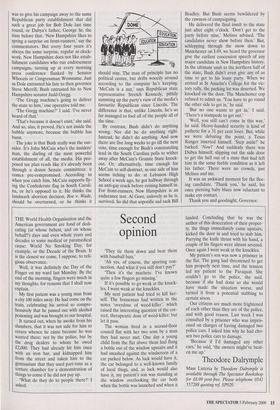Second opinion
THE World Health Organisation and the American government are fond of dedi- cating (at whose behest, and on whose behalf?) days and even whole years and decades to some medical or paramedical cause: World No Smoking Day, for example, or the Decade of the Brain. It is the closest we come, I suppose, to reli- gious observance.
Well, it was definitely the Day of the Finger on my ward last Monday. By the end of the morning, fingers were much in my thoughts, for reasons that I shall now explain.
My first patient was a young man from a city 100 miles away. He had come on the train, celebrating his arrival so compre- hensively that he passed out with alcohol poisoning and was brought to our hospital.
It turned out, when he awoke from his slumbers, that it was not safe for him to return whence he came because he was wanted there: not by the police, but by the drug dealers to whom he owed £2,000. They had already hit him once with an iron bar, and kidnapped him from the street and taken him to the gymnasium that they used part-time as a torture chamber for a demonstration of things to come if he did not pay up.
'What do they do to people there?' I asked. 'They tie them down and beat them with baseball bats.'
`Ah yes, of course, the sporting con- nection. And what if you still don't pay?' 'Then it's the machete. I've known quite a few fingers go missing.' If it's possible to go weak at the knuck- les, I went weak at the knuckles.
My next patient had tried to kill her- self. The houseman had written in the notes 'overdose of weed-killer', which raised the interesting question of the cor- rect, therapeutic dose of weed-killer: but let it pass. The woman lived in a second-floor council flat with her two sons by a man they had never met. One day a young child from the flat above them had flung a bottle out of the window upstairs and it had smashed against the windscreen of a car parked below. As luck would have it, the car belonged to a well-known family of local thugs, and, as luck would also have it, my patient's son was standing at the window overlooking the car both when the bottle was launched and when it landed. Concluding that he was the author of this desecration of their proper- ty, the thugs immediately came upstairs, kicked the door in and tried to stab him. Parrying the knife thrust with his hand, a couple of his fingers were almost severed. Once again I went weak at the knuckles.
My patient's son was now a prisoner in the flat. The gang had threatened to get him properly next time, and the tension led my patient to the Paraquat. She couldn't go to the police, she said, because if she had done so she would have made the situation worse, and turned it from a potential stabbing to certain arson.
Our citizens are much more frightened of each other than they are of the police, and with good reason. Last week I was consulted by a prisoner who was impris- oned on charges of having damaged two police cars. I asked him why he had cho- sen two police cars to damage.
'Because if I'd damaged any other cars,' he said, 'the owners might've beat- en me up.'
Theodore Dalrymple
Mass Listeria by Theodore Dahyrnple is available through The Spectator Bookshop for £8.99 post-free. Please telephone 0541 557288 quoting ref SP020.


























































 Previous page
Previous page